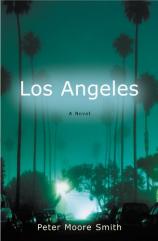Los Angeles
Review
Los Angeles
Once in a while you pick up a book thinking it's one thing and it
turns out that you were way off the mark. This is what I
experienced with LOS ANGELES by Peter Moore Smith. I expected a
kind of noir mystery, and while it certainly has elements of that,
it's different from what one encounters within a novel of that
genre.
The first and major difference is Angel Veronchek, the narrator.
Angel is not a rumpled knight in slightly tarnished armor. He's
really irritating, at least in some ways. Most of this is the
result of the hand that has been dealt to him, rather than one he
picked up on his own. He's an albino, with an extreme sensitivity
to sunlight, and has some legitimate chemical imbalance issues. His
daily activities consist primarily of sitting in his underwear
working on a screenplay that is never going anywhere and playing
the director's cut of Blade Runner constantly on his DVD
player, while his royally rich movie producer dad foots the bill
for everything.
Angel, who is in his early 30s, is not the kind of guy you're going
to spend much time with. So when this exotic-looking woman named
Angela moves in next door to Angel and starts hanging out with him,
it seems too good to be true. That is, until Angela suddenly
vanishes, with only an enigmatic, one-word telephone call left in
her wake. Angel is not content to let her simply disappear. The guy
is in love, and the woman he is in love with seems to be in
trouble. So Angel goes looking for her, hampered to no small degree
by his physical and emotional difficulties. The biggest problem
Angel has, however, is that a lot of people don't want him to find
Angela. Actually, that's not true. Angel's biggest problem is that
the deeper he looks into Angela's past, the more he finds, which
leads him to the conclusion that the Angela he knew might not even
exist. He's wrong, of course. But he's also right.
Smith has crafted an enigmatic work here, one that probably will be
under-appreciated, and regrettably so. We become used to literary
protagonists with whom we can readily sympathize and empathize
within the space of a few pages; Angel is quite different. While
the story is told from his viewpoint, the reader has the benefit of
realizing ahead of the narration that all is not right with Angel,
long before he does. One doesn't, however, know what really is
going on. And even at the end, one still is not entirely
sure.
In this, and in other ways, LOS ANGELES is a subtle tribute to the
work and memory of author Philip K. Dick. BLADE RUNNER, which is a
constant reference point for Angel throughout LOS ANGELES, was
adapted from Dick's haunting novel, DO ANDROIDS DREAM OF ELECTRIC
SHEEP? With the exception of a few mainstream novels, Dick's entire
body of work dealt with perceptions of reality, or the lack
thereof. One cannot read LOS ANGELES without feeling Dick's
presence nearby. As with Dick's best work, Smith's LOS ANGELES is a
mesmerizing, memorable tale that by turns confounds, confuses, and
amazes.
Reviewed by Joe Hartlaub on January 7, 2011




